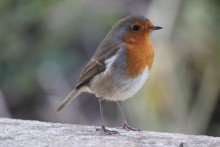The online wildlife recording site ‘Living Record’, developed in Dorset for use anywhere in the country, has reached 500,000 records for 6,800 species across the UK. Dorset Wildlife Trust (DWT) is one of many local conservation organisations championing the system.
DWT’s Great Heath Living Landscape project is encouraging its volunteers to use Living Record to keep track of wildlife in their local patch.
DWT’s Great Heath Living Landscape Community Conservation Officer, Katie Wilkinson, said “We want people using the system to help us build up a picture of how our wild plants and animals are using urban space in gardens and local parks, but also in the network of nature reserves and all the bits in between! We love hearing stories from members of the public about the wildlife they have seen, and many people like to know they are making a difference by adding their sightings to Living Record.”
Living Record has been developed by local wildlife enthusiast, Adrian Bicker, in partnership with theDorset Environmental Records Centre (DERC) and other Dorset recording groups, but the system is now used by wildlife groups around the country.
Adrian said, “It all started with dragonflies in Dorset. But local naturalists wanted more so Living Record now covers many subjects, from birds and bats to butterflies, beetles, bugs and bryophytes. This was always a “grass roots” project, serving the needs of local naturalists and the organisations that manage areas of land, like DWT and our local councils. I feel quite emotional reaching this milestone and would like to thank all those who have provided the advice, support and encouragement along the way. Of course the real heroes are all the people who now regularly record the wildlife that they see, bringing in 100,000 new records each year for Dorset.”
Sign up for the Great Heath enewsletter at www.dorsetwildlifetrust.org.uk and to join Living Record to start recording your wildlife sightings for free, visit www.livingrecord.net. Throughout July we are asking for sightings of slow worms. Visit www.dorsetwildlifetrust.org.uk/sotm-july to find out more and submit your sighting.







